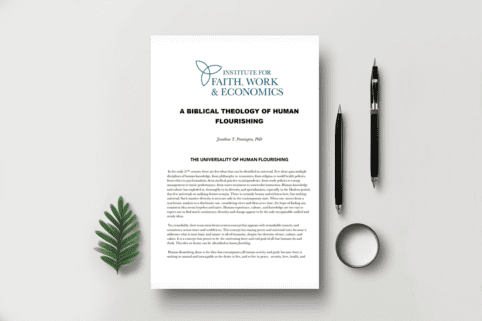Is the Pursuit of Human Flourishing Scriptural?
 BETHANY HERRON
BETHANY HERRON
Vice President of Education
Read more from Bethany
Listen to this article:
The Purpose
In contrast to various cultural, philosophical, and religious traditions, Dr. Jonathan Pennington offers a comprehensive definition of human flourishing which spans the Old and New Testaments and is rooted in the revelation of God through Jesus Christ.
Specifically, he uses Biblical etymology to demonstrate flourishing intertwines with fundamental elements of the Bible’s message–including God’s redemptive purpose in Christ (which assures believers of eternal, abundant life).
The Perspective
With a PhD in New Testament Studies from the University of St. Andrews, Dr. Pennington writes from the conviction that biblical hermeneutics, specifically etymology, reveals a greater understanding of flourishing than the English language provides. He asserts that the telos, the ultimate goal of life, cannot be achieved apart from an understanding of God’s redemptive work.
The Key Points
The pursuit of human flourishing transcends worldviews, cultures, and history.
According to Pennington, “…there is nothing so natural and inescapable as the desire to live, and to live in peace, security, love, health, and happiness.” From Augustine to Aristotle, philosophers have sought a means to that end.
That pursuit can be clearly seen in three eras of Western civilization:
- The first era, rooted in Greek philosophy and epitomized by Augustine, underscored the intimate relationship between human flourishing and a trinitarian God. It was contingent on centering one’s life around God, with happiness emanating from harmonious fellowship with Him and others.
- The second era divorced flourishing from God via the anthropocentric (man-centered) emphasis of the Enlightenment. Emphasis was placed on love for self and others, with universal beneficence as the central goal. This period also saw the emergence of ideologies like Marxism.
- In the third era (the late 20th century) there was a resurgence of focus on individual, experiential satisfaction as the cornerstone of flourishing. It prioritized personal fulfillment and subjective well-being over communal or divine alignment.
Seeking a transcendent, Biblical understanding of the pursuit of human flourishing.
Pennington believes many modern-day Christians resist the claim flourishing is a Biblical theme. Yet, he contends it is central to the original design of Creation and the redemption reign of Christ. His argument stems from an etymological dive into the Biblical concepts of shālôm, ashrê, bārak, and tāmîma:
- The Hebrew word shālôm (eirēnē in Greek) is often understood as “peace” (i.e. the absence of conflict). Pennington contends that while peace can be the result of shālôm, it has the deeper meaning of wholeness or maturity.
Two passages in Isaiah illustrate his point:
“For to us a child is born, to us a son is given, and the government will be on his shoulders. And he will be called Wonderful Counselor, Mighty God, Everlasting Father, Prince of Peace.” (Isaiah 9:6)
He also notes, “Another good example is Isaiah 32:15-20, which describes the time when the Spirit will be poured out, making all the land fruitful, resulting in justice, righteousness, and peace.”
- The Hebrew word ashrê (makarios in Greek) is typically translated “blessed.” Yet, Pennington notes linguists find that rendering deficient. Found mostly in Proverbs and Psalms, ashrê describes “the happy state of the one who lives wisely…[in] covenantal obedience to God.”
Again, examples include:
“Blessed is the man who walks not in the counsel of the wicked, nor stands in the way of sinners, nor sits in the seat of scoffers.” (Psalm 1:1)
“Blessed is the nation whose God is the Lord, the people whom he has chosen as his heritage!” (Psalm 33:12)
In these and other passages, man does not receive unmerited favor from God. Instead, according to Pennington, in accordance with God’s natural law and common grace, man simply lives a joy-filled life on earth when following the commands of God. Following God’s order for life creates a situation in which individuals and communities flourish. Instead of using makarios to pronounce blessing in the beatitudes, Jesus uses it to paint “a picture of true God-centered flourishing.” He makes an appeal and casts an inspiring vision, even as the Psalms, Proverbs, and Isaiah do, for what true well-being looks like in God’s coming kingdom.
- The Hebrew word bārak (eulogeō in Greek) is also translated “blessed” and highlights, “God actively giving and enabling his word to go forth, resulting in benefits such as fertility, authority, peace, and rest.”
This type of blessing only takes place within a relationship, emphasizing the relationship itself is the greatest blessing, attended by the secondary favor that comes from that relationship. God’s interactions with Abraham is an example.
- The Hebrew word tāmîma (teleios in Greek) is often translated “wholeness.” Pennington explains there are over 200 uses of this word in Scripture with varying shades of meaning that revolve around “the idea of wholeness, completeness, and perfection in the sense of wholehearted dedication to God.”
Details We Love
Dr. Pennington presents a convincing overview of God’s heart for man to flourish. More so, his Biblical exploration provides real world implications for followers of Christ serving in charity work. Namely, that we clearly understand we work to alleviate poverty in Jesus’ name and to lead others to flourish as they center their lives on Christ as King. As Pennington says, “[Our work] must be motivated, informed, and colored by the reality of God’s coming kingdom, centered on Jesus the Son, and empowered by the Holy Spirit. Without this anchoring, the pursuit of human flourishing is not biblical….These are practices that testify to the reality of God’s coming reign and are in alignment with what God himself is doing.”
Considerations
Readers should be prepared to engage with a deep and comprehensive study of Biblical terms. It should also be noted this exploration is not directly written to address serving those in poverty. Instead, Pennington seeks to provide a Biblical basis for the work of God’s people toward individual, corporate, and societal flourishing, centered on the rule and reign of Christ.
Who Should Read This?
A Biblical Theology of Human Flourishing is ideal for church leaders, pastors, and those involved in Christian ministry. It’s also valuable for Christian nonprofit leaders who seek a biblical, holistic view of human flourishing.
A Biblical Theology of Human Flourishing can be read for free at The Institute for Faith, Work, and Economics.
Learn more about True Charity here.




